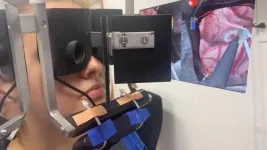A new role for intelligent tutors powered by AI in brain surgery?
AI-guided feedback outperforms human instructors in neurosurgical training study
2024-09-04
(Press-News.org)
Neurosurgery is perhaps one of the most demanding professions in healthcare. Surgeons spend long hours performing operations where expert performance means the difference between a good and bad patient outcome. While operative injuries are rare, when they occur, they can have serious, and lifelong consequences.
Researchers at the Neurosurgical Simulation and Artificial Intelligence Learning Centre at The Neuro (Montreal Neurological Institute-Hospital) of McGill University are striving to improve brain surgery training by designing real-time, intelligent tutors powered by AI. These systems are designed to mimic the role of human surgical instructors in brain surgical training. Intelligent tutors help the learner acquire excellent operative skills by continuously assessing hand movements during simulated brain procedures and providing personalized verbal feedback...
Educating the next generation of neurosurgeons is a long, expensive, and complex process. AI and simulation hold the potential to make the learning process easier while maintaining or enhancing the quality of graduating neurosurgeons’ skills.
Their most recent study was the first randomized controlled trial comparing AI intelligent tutor instruction with human expert human instruction during simulated surgery. They divided 97 medical trainees into three groups, either receiving real-time AI feedback, in-person expert instruction or no real-time feedback.
The trainees who received AI instruction performed significantly better than those who received expert instruction and no real-time instruction. The study found that expert instruction alone led to poorer surgical learning outcomes. By employing their extensive expertise and the new opportunities provided by AI, surgical educators can provide new possibilities for learners to reach their potential as excellent surgeons.
“This study suggests the future of instruction in the operating room may involve human educators utilizing the capacity of AI to further enhance learner surgical skills acquisition,” says Dr. Rolando Del Maestro, Director, Neurosurgical Simulation and Artificial Intelligence Learning Centre
The study, entitled “RealTime multifaceted artificial intelligence vs InPerson instruction in teaching surgical technical skills: a randomized controlled trial”, was published in Nature Scientific Reports on July 2, 2024.
END
ELSE PRESS RELEASES FROM THIS DATE:
2024-09-04
HOUSTON ― The University of Texas MD Anderson Cancer Center’s Research Highlights showcases the latest breakthroughs in cancer care, research and prevention. These advances are made possible through seamless collaboration between MD Anderson’s world-leading clinicians and scientists, bringing discoveries from the lab to the clinic and back.
Protein expression atlas covers almost all cancer hallmarks
The Cancer Genome Atlas (TCGA) and Cancer Cell Line Encyclopedia (CCLE) provide DNA and RNA data from approximately 11,000 patient samples across 33 cancer types and 1,000 cancer cell lines, but limited protein information is available. Researchers led by Han Liang, Ph.D., Rehan Akbani, ...
2024-09-04
VANCOUVER, Wash. – Some of the butterflies most in danger of fluttering out of existence fare better when their habitats are actively managed by humans, a recent study found.
A team led by Washington State University researchers Cheryl Schultz and Collin Edwards analyzed data on 114 populations of 31 butterfly species in 10 U.S. states. Scientists have long warned that insect populations worldwide are falling rapidly due to the combined effects of climate change, habitat loss and pesticides. Overall, the research team found that these at-risk butterflies ...
2024-09-04
Embargoed until 12:01 a.m. Wednesday, September 4, 2024, CLEVELAND: A new national survey by Cleveland Clinic revealed similarities and differences across generations when it comes to men’s health. The survey highlights health priorities and concerns among men; however, there were generational differences in health habits, mental health and the use of social media as a source of health information.
While 95% of men surveyed said living a healthy lifestyle is their top priority, findings show that different health behaviors exist among ...
2024-09-04
About The Study: In this study, women with hepatocellular carcinoma were less likely to receive a deceased-donor liver transplant and more likely to die while wait-listed than men with hepatocellular carcinoma; these differences were largely (but not entirely) explained by sex-based differences in candidate size. For candidates listed with exception scores, additional changes to allocation policy are needed to resolve the sex disparity, including solutions to improve access to size-matched donor livers for smaller candidates.
Corresponding Author: To ...
2024-09-04
For many years, scientists all around the world have been working towards this goal, now suddenly things are happening very fast: it was only in April that a team led by Prof Thorsten Schumm (TU Wien, Vienna) announced a major success. For the first time, an atomic nucleus had been switched from one state to another using a laser – an effect that can be used for high-precision measurements. Now, just a few weeks later, this thorium transition was successfully applied in practice: TU Wien and JILA/NIST (USA) succeeded in combining a high-precision optical atomic clock with ...
2024-09-04
WASHINGTON — As the global threat of H5N1 influenza looms with outbreaks across species and continents including the U.S., three international vaccine and public health experts say it is time to fully resource and support a robust strategy to address this and future potential pandemic influenza threats, including to consider voluntary vaccination for those now at exposure risk.
“At this critical juncture, decisions about vaccine development, stockpiling, and deployment will shape our ability to respond to immediate and future pandemic risks,” write Jesse Goodman, MD, PhD; Rick A. Bright, PhD; and Nicole Lurie, MD, ...
2024-09-04
Resting brain stem cells hardly differ from normal astrocytes, which support the nerve cells in the brain. How can almost identical cells perform such different functions? The key lies in the methylation of their genetic material, which endowes these special astrocytes with stem cell properties. Scientists from the German Cancer Research Center (DKFZ) and Heidelberg University have published their findings in the journal Nature. In mice, the researchers showed that experimentally induced lack of blood ...
2024-09-04
Researchers have uncovered how hormones profoundly affect our immune systems, explaining why men and women are affected by diseases differently.
Scientists from the Karolinska Institutet in Sweden and Imperial College London have shown for the first time which aspects of our immune systems are regulated by sex hormones, and the impacts this has on disease risk and health outcomes in males and females.
It is well established that diseases can affect men and women differently, due to subtle differences ...
2024-09-04
Why do some people feel itchy after a mosquito bite or exposure to an allergen like dust or pollen, while others do not? A new study has pinpointed the reason for these differences, finding the pathway by which immune and nerve cells interact and lead to itching. The researchers, led by allergy and immunology specialists at Massachusetts General Hospital, a founding member of the Mass General Brigham healthcare system, then blocked this pathway in preclinical studies, suggesting a new treatment approach for allergies. The findings are published in Nature.
“Our research provides ...
2024-09-04
By repeatedly scanning the brains of a small group of patients for a year and a half, Weill Cornell Medicine researchers have identified a distinct pattern of neuronal interactions that appears to predispose some people to developing depression.
Published Sept. 4 in Nature, the work highlights the potential of a new “deep scanning” approach to help predict a person’s susceptibility to depression and other neuropsychiatric conditions and may guide the development of novel treatments.
Neuroscientists have long relied on functional magnetic resonance imaging (fMRI) to identify patterns of activity ...
LAST 30 PRESS RELEASES:
[Press-News.org] A new role for intelligent tutors powered by AI in brain surgery?
AI-guided feedback outperforms human instructors in neurosurgical training study




